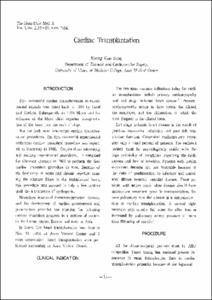동아시아 3국의 서구문명 수용과 그 사상적 영향 -정치사상을 중심으로
- Alternative Title
- Diffusion and Influence of Western Political Thoughts in East Asian Countries
- Abstract
- 19 세기 말-20 세기 초 동아시아 3국의 지성계에서는, 과거의 제도와 사상이 여전히 내외정의 모순에 대응하는 주요 기반이었다. 이 때문에, 토착사상의 맥락에서 서양사상을 수용하고, 서양사상의 충격으로 토착사상이 재해석되는 동서 사상간의 상호작용이 이루어지게 된다. 이런 점에서 토착질서의 다중적 위기는 서양사상의 전파, 국민국가 관념의 수용, 사상의 변화를 위한 좋은 기회였다. 그러나 내외의 위기가 가중되는 상황에서, 구한말의 지식인들은 토착사상에 대한 신뢰를 전면적으로 유보할 수도, 서양사상에 대한 확신을 가질 수도 없었기 때문에, 이 기회를 사상의 혁명적 변화보다는 개량의 길로 연결지었다. 그들이 토착사상과 서양사상을 절충하여, 나름대로의 신국가상(像)을 추구한 것은 그 당연한 결과였다.
Historians of East Asia has a tendency to rely on tradition-modernity approach. But, an important change has been progressed in the study of recent East Asian past. Some began to attack the assumption of radical discontinuity between tradition and modernity. The two categories do not refer to internally consistent, and mutually exclusive entities. Tradition and modernity are seen as fluid, mutually interpenetrable states, with traditional societies containing modern potentialities and modern societies embodying traditional features. In the case of diffusion and acceptance of Western political thoughts, East Asian intellectuals responded to the Western impact, in the late 19th-early 20th century, in terms of concerns and problems inherited from Confucian tradition. There was a tendency to find sanctions for change within the Confucian tradition itself. They, also, reinterpreted Confucianism in order to provide a positive sanction for innovation of traditional order.
Historians of East Asia has a tendency to rely on tradition-modernity approach. But, an important change has been progressed in the study of recent East Asian past. Some began to attack the assumption of radical discontinuity between tradition and modernity. The two categories do not refer to internally consistent, and mutually exclusive entities. Tradition and modernity are seen as fluid, mutually interpenetrable states, with traditional societies containing modern potentialities and modern societies embodying traditional features. In the case of diffusion and acceptance of Western political thoughts, East Asian intellectuals responded to the Western impact, in the late 19th-early 20th century, in terms of concerns and problems inherited from Confucian tradition. There was a tendency to find sanctions for change within the Confucian tradition itself. They, also, reinterpreted Confucianism in order to provide a positive sanction for innovation of traditional order.
- Issued Date
- 1999
- Type
- Research Laboratory
- Alternative Author(s)
- Shin,Yeon-Jae
- Publisher
- 사회과학논집
- Language
- kor
- Rights
- 울산대학교 저작물은 저작권에 의해 보호받습니다.
- Citation Volume
- 9
- Citation Number
- 2
- Citation Start Page
- 75
- Citation End Page
- 93
- Appears in Collections:
- Research Laboratory > Journal of social science
- 파일 목록
-
-
Download
 000002025246.pdf
기타 데이터 / 257.33 kB / Adobe PDF
000002025246.pdf
기타 데이터 / 257.33 kB / Adobe PDF
-
Items in Repository are protected by copyright, with all rights reserved, unless otherwise indicated.